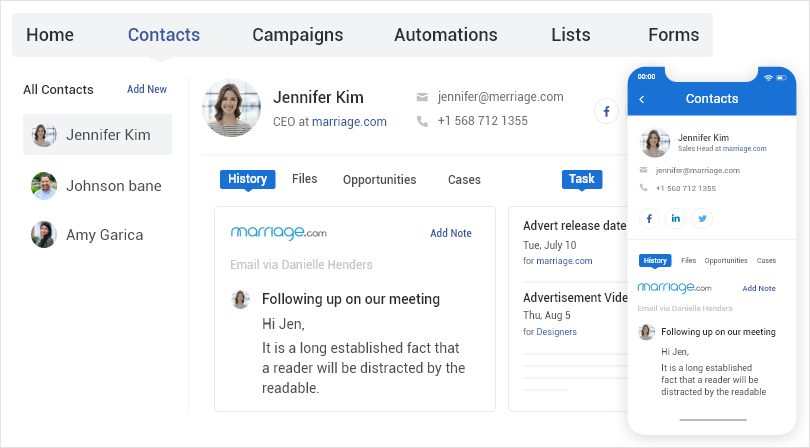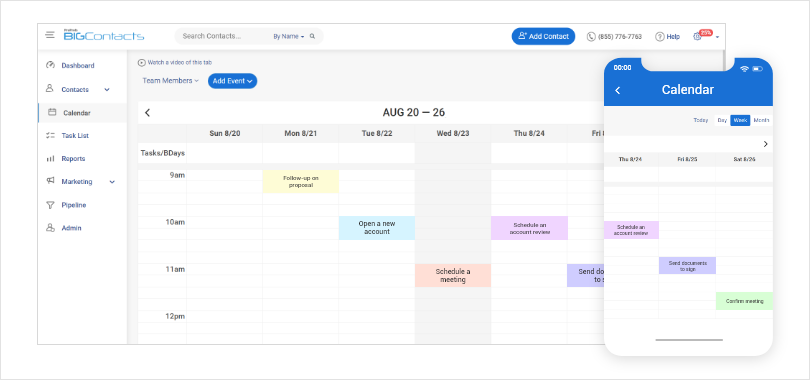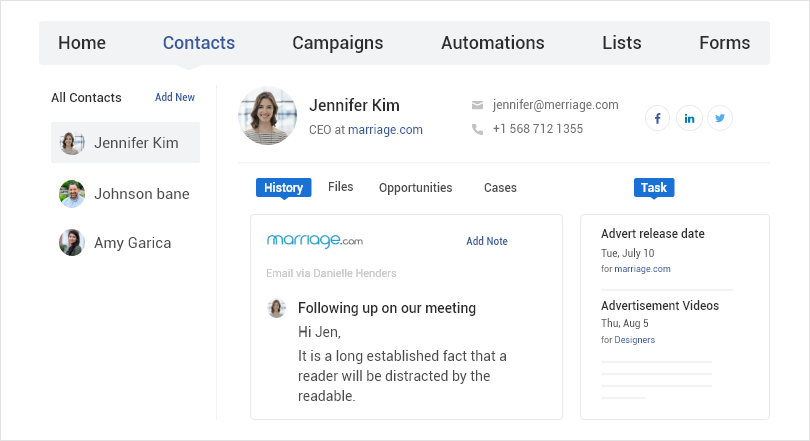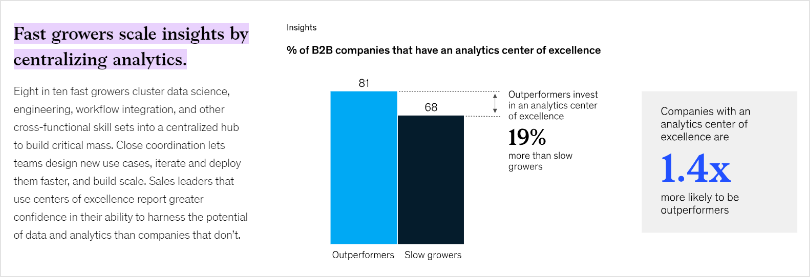Imagine having a single platform that lets you store, access, and update all your customer data anytime, anywhere. A platform that automates your sales, marketing, and service processes and helps you deliver personalized experiences across channels.
Sounds too good to be true, right? Well, it’s not.
It’s the magic of cloud CRM – a robust technology that can help you scale your business and adapt to changing needs without costly and complex IT infrastructure.
This cloud CRM guide will show you how it works and why it’s better than traditional CRM systems. We’ll also give you some practical advice on how to choose the best solution for your business and how to get the most out of it.
Ready to grow your business without breaking the bank on IT? Let’s get started.
What is Cloud CRM?
A Cloud CRM (Customer Relationship Management) system is a web-based application that enables businesses to manage customer interactions, data, and sales process.
This cloud-based approach is also known as Software-as-a-Service (SaaS), cloud CRM, online CRM, and web CRM. It eliminates the need for on-premises software installations and allows teams to access CRM data securely from any part of the world and at any time as long as they have an internet connection.

Take a deeper dive into CRM essentials with this quick and informative video.
Who Should Use Cloud-Based CRM?
Cloud-based CRM solutions are ideal for a wide range of businesses, including-
1. Startups & Entrepreneurs
Cloud-based CRM provides startups and entrepreneurs with a flexible and accessible platform to efficiently organize and nurture their customer base while focusing on business growth.
Read More: List of 6 Best CRM for Startups
2. Small and Medium-Sized Businesses (SMBs)
Cloud CRM is perfect for SMBs looking for a cost-effective and scalable solution to manage their customer relationships without the burden of maintaining expensive hardware or IT infrastructure.
Watch this quick video on why CRM is important for small businesses and how to choose the best solution.
3. Remote Teams
Cloud CRM allows remote teams from virtual business addresses and remote workspace to collaborate seamlessly by centralizing customer data, communication, and sales progress, fostering efficient teamwork regardless of geographical boundaries.
4. Sales Professionals
With cloud CRM, sales representatives can access critical customer data and sales information from their mobile devices while traveling or during client meetings, ensuring they stay productive and informed.
Read More: 10 Best Sales CRM Software to Drive Business Growth
5. Businesses Looking for Scalability
Cloud CRM solutions can be easily scaled up based on the evolving needs of a business. This makes it an excellent choice for companies experiencing rapid expansion or increase in customer base.
6 Compelling Reasons To Embrace Cloud CRM
In this section, we’ll explore six undeniable reasons why businesses are increasingly turning to cloud CRM solutions to revolutionize their customer interactions and elevate their overall performance.
1. Cost-Efficiency
Cloud applications eliminate the need for purchasing expensive software licenses. Instead, you can opt for subscription-based pricing models, which often include regular updates, data security, and support.
2. Accessibility
Cloud CRM enables users to access customer data and insights from any device with an internet connection. Whether you’re in the office, on the road, or working from home, you can stay connected and informed.

3. Automatic Updates
Cloud CRM providers continuously improve their platforms with regular updates and feature enhancements. As a result, you can leverage the latest tools and functionalities without worrying about manual updates.
4. Scalability
Unlike traditional CRM systems, which may require extensive overhauls to accommodate growth, cloud-based CRM solutions can easily scale up to meet changing business needs.
5. Collaboration
With cloud CRM, teams can collaborate effortlessly by sharing real-time customer information, communication history, and sales data, fostering a unified and informed approach to customer interactions.
6. Real-Time Analysis
Cloud-based CRM systems provide real-time insights into customer behavior, sales performance, and marketing campaign effectiveness, empowering you to make data-driven decisions instantly.
7 Key Features of Cloud CRM
When it comes to cloud-based CRM, the following key features empower businesses to build and maintain successful customer relationships.
1. Contact Management
At the heart of any CRM system is contact management.

Cloud CRM provides a centralized database to store all your customer information in one place. From basic contact details to communication history and purchase behavior, you can access a comprehensive view of each customer.
Efficient contact management enables you to retrieve data, track interactions, and nurture leads quickly. With a 360-degree view of your customers, you can better understand their needs, preferences, and pain points, fostering loyalty.
2. Marketing Automation
Cloud CRM enables you to automate your marketing efforts, segment your audience based on behavior and preferences, and deliver personalized content at the right time. From email marketing campaigns to social media posts, automation simplifies marketing processes, saving you time and effort.
What’s more? By analyzing customer responses and tracking campaign success, you can fine-tune your marketing strategies for maximum impact and ROI.

3. Task Management
Stay on top of your to-do list with task management features in cloud CRM.
Assign tasks to team members, set deadlines, and track progress to ensure nothing falls through the cracks. Task management fosters accountability and collaboration, ensuring that your team operates efficiently and meets important deadlines.

4. Pipeline Tracking
Manage your sales pipeline easily using cloud CRM’s pipeline tracking capabilities. Visualize your sales opportunities at various stages of the sales process to identify potential roadblocks and prioritize deals.
By monitoring your pipeline, you can allocate resources effectively and make data-driven decisions to accelerate deals through the sales funnel.
![]()
5. Collaboration
Effective collaboration is the key to success in today’s dynamic business landscape.
Cloud CRM offers collaboration features that facilitate seamless communication and knowledge sharing among team members. Whether it’s sharing insights, updating deal statuses, or discussing strategies internally using notes, emails, shared files, etc., collaboration tools promote teamwork and foster a cohesive work environment.
6. Reporting & Analytics
Data is the fuel that drives business growth, and Cloud CRM provides robust reporting and analytics tools to turn raw data into actionable insights. Detailed reports on customer behavior, sales performance, and marketing effectiveness empower you to make informed decisions and identify improvement areas.
By monitoring key performance indicators (KPIs) and analyzing customer interactions, you can identify opportunities for improvement and address potential issues promptly. Real-time data visibility enables you to pivot your strategies dynamically, ensuring your business stays agile and competitive.
7. Integration
To achieve maximum efficiency, your CRM should seamlessly integrate with other essential business tools, such as-
- Email Marketing Platforms: Sync customer data to your email marketing platform for targeted and personalized campaigns.
- Accounting Software: Automatically update customer transactions and account information to maintain financial accuracy.
- Collaboration Tools: Integrate CRM with project management and communication apps to streamline team collaboration.
Integration capabilities bridge the gap between various systems, enabling smooth data exchange and streamlined workflows. It eliminates data silos and enhances cross-departmental collaboration. This empowers your team to work cohesively, improve productivity, and deliver a unified customer experience.
Choosing the Right Cloud-Based CRM Solution
When it comes to selecting the best cloud CRM for your business, making the right choice can significantly impact your overall success. By carefully considering the following factors, you can confidently choose the solution that propels your business toward greater success in the digital era.
1. Scalability
Your business is constantly evolving, and your CRM should grow with you.
Ensure the Cloud CRM solution you choose is scalable and can accommodate your future needs without compromising performance or data integrity. A scalable CRM allows you to add more users, increase data storage, and handle higher traffic as your business expands.
Why it matters: Scalability ensures your CRM investment remains viable in the long run, supporting your business growth without the need for frequent system upgrades or migrations.
2. Ease of Use
A user-friendly interface is essential for faster CRM adoption. Look for a tool with an intuitive and straightforward navigation system to minimize the learning curve for your team members. A user-friendly CRM encourages higher user adoption, leading to better utilization of its features and capabilities.
Why it matters: An easy-to-use CRM reduces training time, increases productivity, and fosters a positive user experience, making it easier for your team to leverage the CRM’s capabilities fully.
3. Customization
Every business is unique, and your CRM should be flexible enough to adapt to your specific needs. Seek a cloud CRM that allows customization of processes, data fields, and workflows to align with your unique business requirements. Tailoring the CRM to match your existing processes ensures a seamless transition and maximizes efficiency.
Why it matters: Customization empowers you to align your CRM with your business processes rather than the other way around, resulting in a more efficient and personalized customer relationship management approach.
4. Data Security
Data security is paramount when dealing with sensitive customer information. Verify that the Cloud CRM provider employs robust security measures, such as data encryption, firewalls, access controls, and Zero Trust pillars to safeguard your data from unauthorized access or breaches.
Ensure the CRM you choose adheres to industry-specific compliance standards, like GDPR or HIPAA, if applicable to your business.
Why it matters: Protecting customer data not only safeguards your reputation but also ensures compliance with data privacy laws, preventing potential legal and financial consequences.
5. Customer Support
Reliable customer support is essential for smooth CRM implementation and ongoing usage. Opt for a provider with excellent customer support, offering responsive assistance and comprehensive training resources for your team. Reliable customer support ensures any issues or questions are addressed promptly, minimizing disruptions to your business operations.
Why it matters: A responsive support team can help you overcome challenges, maximize the CRM’s potential, and ensure a positive user experience.
Read More: The Ultimate List of Cloud-Based CRM
Cloud CRM Implementation – How to Get Started in 5 Steps
Here is a step-by-step guide to facilitate cloud CRM growth within your organization.
1. Assess Your Needs
Identify your business requirements and goals, considering factors like the size of your team, sales processes, and customer data volume.
2. Choose the Right CRM
Based on your needs, select the best CRM tool that aligns with your business goals and offers the required features and functionalities.
3. Data Migration
Plan and execute a secure data migration strategy to transfer existing customer data from legacy systems or spreadsheets to the new CRM platform.
4. Train Your Team
Create online courses to provide comprehensive training to your team members and ensure that they are comfortable with the new system you are deploying.
5. Gradual Rollout
Implement the CRM in phases, starting with a pilot group before rolling it out to the entire organization. This approach allows you to identify and address any issues efficiently.
Read More: The CRM Implementation Plan: 12-Step Process
7 Best Practices to Maximize Cloud CRM ROI
Here are 7 proven cloud CRM tips to optimize its potential and deliver exceptional results.
1. Set Clear Objectives
Clearly define your CRM goals and objectives. Identify what you aim to achieve, whether it’s improving customer service, increasing sales, or enhancing marketing efforts. Having well-defined goals keeps your implementation focused and measurable.
2. Involve Key Stakeholders
Involve key stakeholders from different departments, such as department heads or managers, in the CRM implementation process. Their inputs are invaluable for understanding specific needs, ensuring smooth adoption, and fostering buy-in throughout the organization.
3. Data Cleansing & Migration
Before migrating data to the cloud CRM, conduct thorough data cleansing to ensure accuracy and eliminate duplicates. Migrate only relevant and essential data to prevent clutter and confusion within the CRM system.
Read More: How to Keep Your CRM Data Clean: 10 Best Practices to Get Started
4. Training & Onboarding
Provide comprehensive training and onboarding to all users who will interact with the CRM. Ensure they are familiar with the system’s functionalities and how to use it effectively to maximize its potential.
5. Customize Your Workflows
Customize the CRM to align with your business workflows. Tailor data fields, processes, and reports according to your unique business needs, streamlining operations and ensuring a seamless fit.
6. Regular Updates & Maintenance
Stay current with CRM updates and regularly maintain the system to ensure it operates smoothly and efficiently. Regular updates often include bug fixes, security patches, and new features.
7. Feedback & Continuous Improvement
Encourage team members to provide feedback on the CRM system’s usability and functionality. Use this feedback to make continuous improvements and enhancements to the CRM.
The Future of Cloud CRM: 5 Trends to Watch Out For
The world of cloud-based CRM is constantly evolving, driven by technological advancements and changing customer expectations.
Businesses that embrace innovation and leverage these technologies will gain a competitive edge by delivering exceptional customer experiences.
Here are some exciting future trends that are shaping cloud CRM’s future.
1. Artificial Intelligence (AI) for Smarter Customer Insights
According to Forbes Advisor, over 60% of business owners believe that AI has the potential to improve their customer relationships.
AI is revolutionizing the way businesses analyze customer data, enabling deeper insights and predictive analytics. By leveraging machine learning algorithms, cloud CRM systems can identify patterns and trends in vast datasets, helping you make data-driven decisions with greater precision.
Such a system can analyze customer behavior across multiple touchpoints, predicting preferences and identifying potential upselling opportunities.
Read More: Revolutionize Contact Data Standardization With AI
2. Voice Integration for Enhanced Usability
As voice technology becomes more prevalent in our daily lives, integrating voice commands into cloud CRM systems will become a game-changer.
Voice integration offers hands-free navigation and data retrieval, making it easier for sales teams and customer service representatives to access information on the go.
For example-
Sales reps can use voice commands to access customer information, update records, and schedule follow-up tasks while traveling or in the field. This not only saves time but also improves overall productivity.
3. Hyper-Personalization for Tailored Customer Experiences
According to a report by Epsilon, 80% of consumers are more likely to do business with a company that offers personalized experiences.
Customers today expect personalized experiences from the brands they engage with. Hyper-personalization takes customer engagement to the next level by delivering highly customized interactions based on individual preferences, behavior, and past interactions.
A Cloud CRM with hyper-personalization capabilities can provide real-time product recommendations, personalized content, and targeted offers based on a customer’s purchase history and browsing behavior.
4. Advanced Data Analytics for Predictive Sales & Marketing
According to McKinsey, companies that have analytics at their center are more likely to outperform their competitors.

Cloud-based CRM systems will continue to harness the power of advanced data analytics to predict customer behavior, optimize sales processes, and refine marketing strategies.
By analyzing historical customer data and market trends, a CRM can forecast sales opportunities, identify potential leads, and suggest the best time to approach customers.
5. Internet of Things (IoT) Integration for Enhanced Customer Insights
IDC reports that investments in IoT technology are projected to surpass $1 trillion in 2026, highlighting the significant impact of IoT in various industries, including CRM.
As IoT devices become more prevalent, integrating them with CRM systems can provide you with a wealth of information about customer behavior and preferences.
A connected CRM can collect data from IoT devices, such as wearables or smart appliances, to better understand how customers interact with products and services. This data can be used to create personalized offerings and improve customer experiences.
Join the Cloud CRM Revolution for Enhanced Business Growth!
As technology continues to evolve, embracing the cloud becomes more than just a trend; it’s a strategic imperative.
Today’s business landscape demands efficient, accessible, and scalable solutions, making cloud CRM a necessity for growth. By adopting a cloud CRM platform, you can streamline workflows, enhance customer interactions, and gain invaluable insights into your business operations.
When it comes to reliability, innovation, and exceptional performance, BIGContacts emerges as the undisputed champion. Its intuitive interface, cutting-edge features, and top-notch security measures create a seamless and empowering experience for your entire team.
With BIGContacts at your side, you can bid farewell to clunky legacy systems and embrace the agility and efficiency of cloud-based operations.
No more data silos or missed opportunities; BIGContacts empowers you to harness your customer data effectively, nurture relationships, and drive growth like never before.
FREE. All Features. FOREVER!
Try our Forever FREE account with all premium features!






